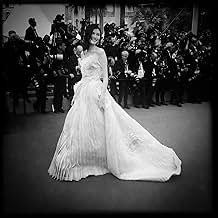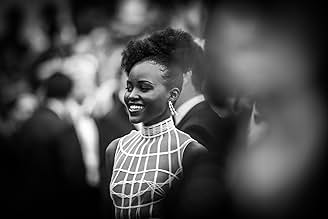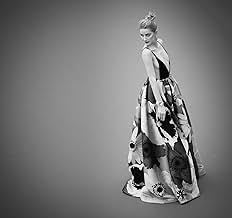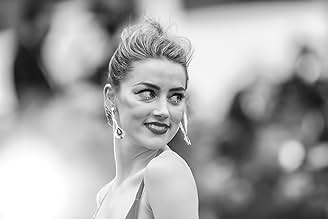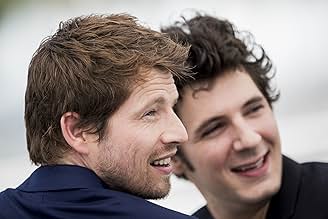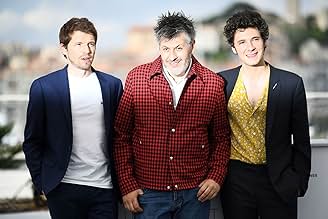AVALIAÇÃO DA IMDb
6,8/10
4,4 mil
SUA AVALIAÇÃO
Um escritor parisiense e um jovem estudante de Rennes se apaixonam.Um escritor parisiense e um jovem estudante de Rennes se apaixonam.Um escritor parisiense e um jovem estudante de Rennes se apaixonam.
- Direção
- Roteirista
- Artistas
- Prêmios
- 6 vitórias e 11 indicações no total
Marlene Saldana
- L'actrice
- (as Marlène Saldana)
Avaliações em destaque
Fundamentally ordinary yet incredibly self-centered, the characters in Christophe Honore's "Sorry, Angel" are not easy people to like. They are mostly a group of gay and bisexual men with complicated lives who find that relationships aren't necessarily what they're good at; even having a job, earning a living or just being 'themselves' also seem to pose a problem. The two main characters are Jacques, a writer in his thirties, (Pierre Deladonchamps), and Arthur, (Vincent Lacoste), a younger student, who meet, have sex and then go about the business of falling in love but find 'happy ever after' something of a pipedream.
It's territory Honore has explored before and more explicitly but this well-crafted, if overtly cool, movie represents something of a step forward if only in terms of style. This is a more formal, less kinetic, Honore but one still unable to shake off that sense of ennui. The performances are excellent but the characters aren't engaging. Also setting it at a time when AIDS was more prevalent than it is now seems like an unnecessary plot device rather than an attempt to get us to understand or care more about the people we see. Throw in a girlfriend and Jacques' young son and you get the impression that Honore is going out of his way to be 'cool' as if making a gay epic but one without a centre. Add a load of references to cinema and literature and you know exactly who this is aimed at. One for the fans, i'm afraid.
It's territory Honore has explored before and more explicitly but this well-crafted, if overtly cool, movie represents something of a step forward if only in terms of style. This is a more formal, less kinetic, Honore but one still unable to shake off that sense of ennui. The performances are excellent but the characters aren't engaging. Also setting it at a time when AIDS was more prevalent than it is now seems like an unnecessary plot device rather than an attempt to get us to understand or care more about the people we see. Throw in a girlfriend and Jacques' young son and you get the impression that Honore is going out of his way to be 'cool' as if making a gay epic but one without a centre. Add a load of references to cinema and literature and you know exactly who this is aimed at. One for the fans, i'm afraid.
To Please, to Love, and to Run Quickly is nowhere near the sentimental use of the word sorry, and who is the angel? I also dislike the three in a bed image used on the poster as it bears little resemblance to the content of the film. I will give no spoilers, but I did not see one sexual threesome. and to be honest the sexuality in the film was coy and of the 'hide the penis at all costs' school. For those who have read my reviews please see the one on 'Theo and Hugo'.
I have awarded this film 7/10 because I thought it was a good film but not as good as it could have been. The dialogue in French is brutally difficult to follow as there is a lot of slurping over words and saying things in a way that you can only truly follow if you are in the same room with the people speaking, and then .... I found the characters drab, and the bisexual Breton tiresome.
And now for a major criticism about films set in the past about Aids. Where were the films during that period of the crisis? This retro look back makes me angry. Film makers should have had the courage back then to deal with this period in our history. Films like 'Theo and Hugo' are masterful as they deal with the situation now and are up to date. One reviewer here summed this up for me. He or she says, love-and romanticism-in the days of AIDS. In the days of? This is not a past thing. The days are now. Homosexuality and HIV are now. And yes as a friend of mine said, they need to know how it was, but frankly with a still on-going crisis we need to know how it IS.
One good element of this film is that it shows a child in a homosexual household in a positive way, and despite my slight boredom with the relationships, it is at least about an important issue. French film is waking up to homosexuality thanks to a list of good directors, and the dark negativity of the Nouvelle Vague, where love was strictly heterosexual, has slipped back into the waters from where it came. The Nouvelle Vague liberated image, but was feeble on diversity and dodgy on politics. Honore is a great director, but I am still waiting for his great film.
I have awarded this film 7/10 because I thought it was a good film but not as good as it could have been. The dialogue in French is brutally difficult to follow as there is a lot of slurping over words and saying things in a way that you can only truly follow if you are in the same room with the people speaking, and then .... I found the characters drab, and the bisexual Breton tiresome.
And now for a major criticism about films set in the past about Aids. Where were the films during that period of the crisis? This retro look back makes me angry. Film makers should have had the courage back then to deal with this period in our history. Films like 'Theo and Hugo' are masterful as they deal with the situation now and are up to date. One reviewer here summed this up for me. He or she says, love-and romanticism-in the days of AIDS. In the days of? This is not a past thing. The days are now. Homosexuality and HIV are now. And yes as a friend of mine said, they need to know how it was, but frankly with a still on-going crisis we need to know how it IS.
One good element of this film is that it shows a child in a homosexual household in a positive way, and despite my slight boredom with the relationships, it is at least about an important issue. French film is waking up to homosexuality thanks to a list of good directors, and the dark negativity of the Nouvelle Vague, where love was strictly heterosexual, has slipped back into the waters from where it came. The Nouvelle Vague liberated image, but was feeble on diversity and dodgy on politics. Honore is a great director, but I am still waiting for his great film.
Maybe, the fundamental virtue of film is to demonstrate nothing. It is only a story about relationship, about choices, love, life, happiness and fall. Not for impress, not for be manifesto, it seems more a sort of confession to the viewer, exploration of pieces of life, delicate confesions and easy portraits of the imposibility to be the expected one by the other and invitation to discover, from other perspective, the life. No doubts, a beautiful film but, unfortunatelly, not the most convincing. But nice.
The world has changed a lot since the French New Wave. Audiences have shorter attention spans and don't seem to enjoy literary films as much. I gage if a film is too long by whether I look at my watch in a cinema or pause a streaming one at home to see how mich is left. I did neither on this film.
I was pulled into this film's world. It's yet another film that reminds me that I love the French cinema. This witty, complex, sexy, dramatic, funny, intelligent, literary, romantic, completely honest portrait of gay life in 1993, captured nuances of gay life not seen in American film. The acting is terrific.
I was pulled into this film's world. It's yet another film that reminds me that I love the French cinema. This witty, complex, sexy, dramatic, funny, intelligent, literary, romantic, completely honest portrait of gay life in 1993, captured nuances of gay life not seen in American film. The acting is terrific.
I have mixed feelings about this movie. It's not bad, but it's not awesome either. Some other gay films, such as « Call me by your name » and « Beats per minute », moved me more than this one. Moreover, this love affair sounds a bit unrealistic, given the circumstances (disease, distance and age gap). Fortunately, there are nice moments of tenderness (the reunion in Paris), emotion (the last scene) and humor (Denis Podalydès' choreography or Vincent Lacoste's striptease). The soundtrack features some good music, such as the delicate song « Les gens qui doutent ».
Você sabia?
- CuriosidadesThe character of Jacques (Pierre Deladonchamps) shares his surname with Pier Vittorio Tondelli, an Italian author who died of AIDS.
- Citações
Pierre: Cruelty is not one man wounding another, mutilating or torturing him, severing his limbs or his head, or even making him cry. The true, terrible cruelty is that a man who cuts another off, interrupting him like dots in a sentence, or looking away from him, making him an error of the gaze, an error of judgement, an error like a letter crumpled up after starting it, after writing the date.
- Trilhas sonorasOne Love
Performed by Massive Attack
Principais escolhas
Faça login para avaliar e ver a lista de recomendações personalizadas
- How long is Sorry Angel?Fornecido pela Alexa
Detalhes
Bilheteria
- Orçamento
- € 3.610.000 (estimativa)
- Faturamento bruto nos EUA e Canadá
- US$ 30.628
- Fim de semana de estreia nos EUA e Canadá
- US$ 6.559
- 17 de fev. de 2019
- Faturamento bruto mundial
- US$ 1.636.273
- Tempo de duração2 horas 12 minutos
- Cor
- Proporção
- 1.85 : 1
Contribua para esta página
Sugerir uma alteração ou adicionar conteúdo ausente

Principal brecha
By what name was Conquistar, Amar e Viver Intensamente (2018) officially released in India in English?
Responda
![Assistir a Bande-annonce [OV]](https://m.media-amazon.com/images/M/MV5BMGQ2ZDgwYTUtMmRhYy00ZDNkLWI1OTctZTc1YjMxM2ZkMmY2XkEyXkFqcGdeQXRodW1ibmFpbC1pbml0aWFsaXplcg@@._V1_QL75_UX500_CR0)
